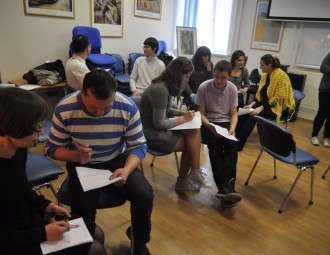The Assembly of NGOs held discussion about values and civil initiatives in Belarusan education

The round table was organized as a follow-up to the round table “Civil education. Values” held earlier in Minsk.
On 26th February, the Assembly of NGOs launched a round table on education, having gathered notable professionals in the sphere. The event was organized as a follow-up to the round table “Civil education. Values” held in December 2014 in Minsk.
The first panel of the round table called “Who will create values in Belarusan education? Belarusan and international experience” united professionals in informal education. They told about their civil initiatives and main activities.

Valiantsina Bystryk, leader of a literary community and an informal school “Belarusan Wheel” from Navahradak, stressed that it is important to develop common sense in young people so they think independently and see themselves as part of the global civilization.
Michas Bulavacki, coordinator of the “Belarusan Pentathlon” project in Mahilieu, told about their initiative, how they focus on the work with pupils and their parents and teach them to defend their rights. He suggested creating a “Ministry of Informal Education”.

The second panel was dedicated to civil initiatives led by students, their parents and teachers.
Volha Mazurava, member of the executive bureau of the Belarusan Language Society, told about parent’s community created in gymnasium #23 in Minsk, which became an effective mechanism of solving the internal school problems. For instance, the community defended the right of the pupils to establish a chess club, to wear national costumes for the prom, etc.

Maryna Shtrachava from the “Student Council” NGO focused on the positive tendencies in the universities, having mentioned that quite a lot of new student initiatives have aroused recently, such as BASS and “24 hours dorm”.
Alena Masliukova, a teacher from Salihorsk who had been fired for her civil activities dwelled on the protection of teacher’s rights and the role of pupils’ and parents’ solidarity in the process.

Civil activist and linguist Vinchuk Viachorka noted that education is a way of nation’s consolidation. At the moment the State doesn’t pay much attention to educational matters nowadays, so civil society tries somehow to compensate that. “The destiny of Belarus depends on what our kids will have in their hearts and minds,” added Viachorka.
-
03.01
-
07.10
-
22.09
-
17.08
-
12.08
-
30.09



























